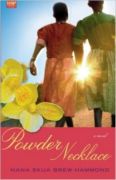
Powder Necklace
Written by Nana Ekua BrewHammond
Washington Square Press, 2010, 280 pp.
ISBN: 9781439126103
Lila lives in London with her divorced mother. The mother-daughter relationship is strained, leading to Lila being sent to live with her aunt and uncle in Ghana within the first few pages. She spends a brief time with her relatives and is then sent to Dadaba, an exclusive, all-girls boarding school. In Ghana, Lila learns valuable lessons about life and her true identity.
Based on the author’s life, Powder Necklace differs from the archetypical diaspora story of leaving the east for the west. Instead, the novel resists cultural imperialism by positing the reclamation of Africa and its traditions and culture. For example, when Lila cries about returning to London immediately after arriving in Ghana, her mother responds, “This will be good for you. You’ll learn about Ghana” (p.20). A few pages later, Lila’s aunt reiterates this message, saying, “Take this opportunity to learn a new way of doing things” (p.23). The idea of returning home to learn about one’s self and culture is not foreign to diasporic people. The Akan people, who occupy Ghana and the Ivory Coast, subscribe to the concept of Sankofa. The symbol for Sankofa is a mythical bird flying forward with its head turned backward. There is an egg in the bird’s mouth, depicting the gem of the past upon which wisdom is based and from which generations will benefit. This symbol is often associated with the proverb, “Se wo were fin a wosankofa a yenyi,” which translates to “It is not wrong to go back for that which you have forgotten” (Kanu, 2011, p. 25-34).
Sankofa is complicated in Powder Necklace because Lila cannot remember what she has never known. She has lived far removed from her parents’ homeland and culture and so operates almost entirely within the scope of being British. Throughout the novel, Lila continues to search for identity as she moves between London, Kumasi, Cape Coast and the United States. Each location and relocation affects her development. She finds herself shifting loyalties and identification before finally discovering her own answers. In the end Lila reflects most on what she learned in Ghana, “Maybe the point was to keep your head up—wear your powder necklace—no matter what” (p. 276).
This book can be included in a text set around the theme of migration and the maternal. Three other novels from the African diaspora that feature black, female adolescent protagonists who leave home on a journey of becoming include Coe Booth’s (2010) Kendra (United States), Adwoa Badoe’s (2010) Between Sisters (Ghana) and Lynn Joseph’s (2013) Flowers in the Sky (Dominican Republic).
Powder Necklace, Brew-Hammond’s debut novel, is a fictionalized account of her own experience. Nana Ekua Brew-Hammond was born in the United States and raised in Queens, New York. When she was twelve-years-old, she and her siblings were sent to attend a boarding school in their parents’ home country of Ghana. She reports feeling “divorced from who she was,” and said she wanted to capture her thoughts about “decisions being made for girls” (Fredua-Agyeman, 2010). This is what led her to write a transcontinental young adult novel about Lila Adjei, a fourteen-year-old girl of Ghanaian descent.
References
http://freduagyeman.blogspot.com/2010/09/powder-necklace-by-nana-ekua-brew.html
Kanu, Y. (2011). Integrating Aboriginal perspectives into the school curriculum purposes, possibilities, and challenges. Toronto: University of Toronto Press.
Desiree Cueto, Tucson Unified School District, Tucson, AZ
WOW Review, Volume VIII, Issue 2 by Worlds of Words is licensed under a Creative Commons Attribution-NonCommercial-ShareAlike 4.0 International License. Based on work at https://wowlit.org/on-line-publications/review/viii-2/
